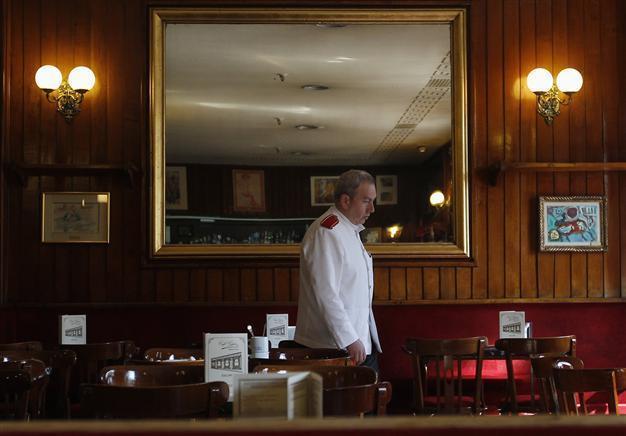Madrid's famed Cafe Gijon fights for terrace rights
MADRID - Reuters

Waiter Alejandro Diaz works inside Spain's historic Cafe Gijon in Madrid March 16, 2012. REUTERS photo
The epicenter of Madrid's renowned intellectual cafe culture, the 124-year-old Cafe Gijon, has survived civil war, the Franco dictatorship and the Internet age, but could face extinction in a bidding war over the lease to its sidewalk terrace.Spanish literary giants such as poet and playwright Federico Garcia Lorca and "Generation of '98" writers Pio Baroja and Camilo Jose Cela sat at the white marble tables of the cafe on the wide Recoletos boulevard.
Nobel laureate Cela's best-known novel "The Hive" was inspired by the "tertulias" or political and cultural debates that still go on today at the cafe, which opened in 1888. Back in their day, Ava Gardner, Truman Capote and Orson Welles stopped in. Contemporary writers Francisco Umbral and Arturo Perez-Reverte still frequent the cafe.
Now the lease on Gijon's sidewalk cafe, on the grassy strip in the middle of the Recoletos boulevard, has expired and Madrid's city government has put it up for bids as it does every 10 years.
Staff at the cafe, which has 44 workers, fear the establishment will be outbid for the lease and that Gijon will not be viable without the income from the terrace.
"If the management loses the terrace which generates money to maintain staff and the cafe ... management say, and I fear, they will feel forced to sell," said Jose Barcena, a waiter at Gijon for 38 years and also the cafe's spokesman. "It would be such a shame, it would be ... like losing places like El Rastro (antique market), the Prado Museum or any place that makes up the fabric of Madrid," he said.
TRADITION REIGNS
Traffic tunnels and a modern metro network may interlace their city, but Madrilenos cling fervently to their unique urban culture: an early evening stroll or "paseo", followed by a lively, high-volume discussion at a cafe or bar such as Gijon, then a late dinner at home.
Ninety-five-year-old artist and writer Antonio Granados has frequented Cafe Gijon since he was a student. He still visits every day and sits at the same table. It was an outrage that the sidewalk rights might go to another company, he said.
"Now some guy comes along who has nothing to do with culture or art, who just wants to make a profit from the terrace," Granados said.
According to local media reports, Gijon's owners will lose the bid for the rights to the terrace, beat out by deeper pockets. A spokesman for city hall was not able to confirm that.
The city hall spokesman did not say when the local government would announce whether Cafe Gijon gets to keep the terrace or not.
Spain has the highest unemployment rate in the euro zone, at 23 percent. With more than 5 million people out of work, Gijon staffers are getting concerned about their futures.
"I am worried without a doubt. I was jobless before and now that I have work and am happy, we have this problem and we don't know if it will be resolved," said Luis Miguel Martin, 46, also a waiter at the cafe.
In the meantime waiters continue to pour hundreds of cups of coffee a day as artists and writers engage in lively debate and tourists visit one of Madrid's famous establishments.
















